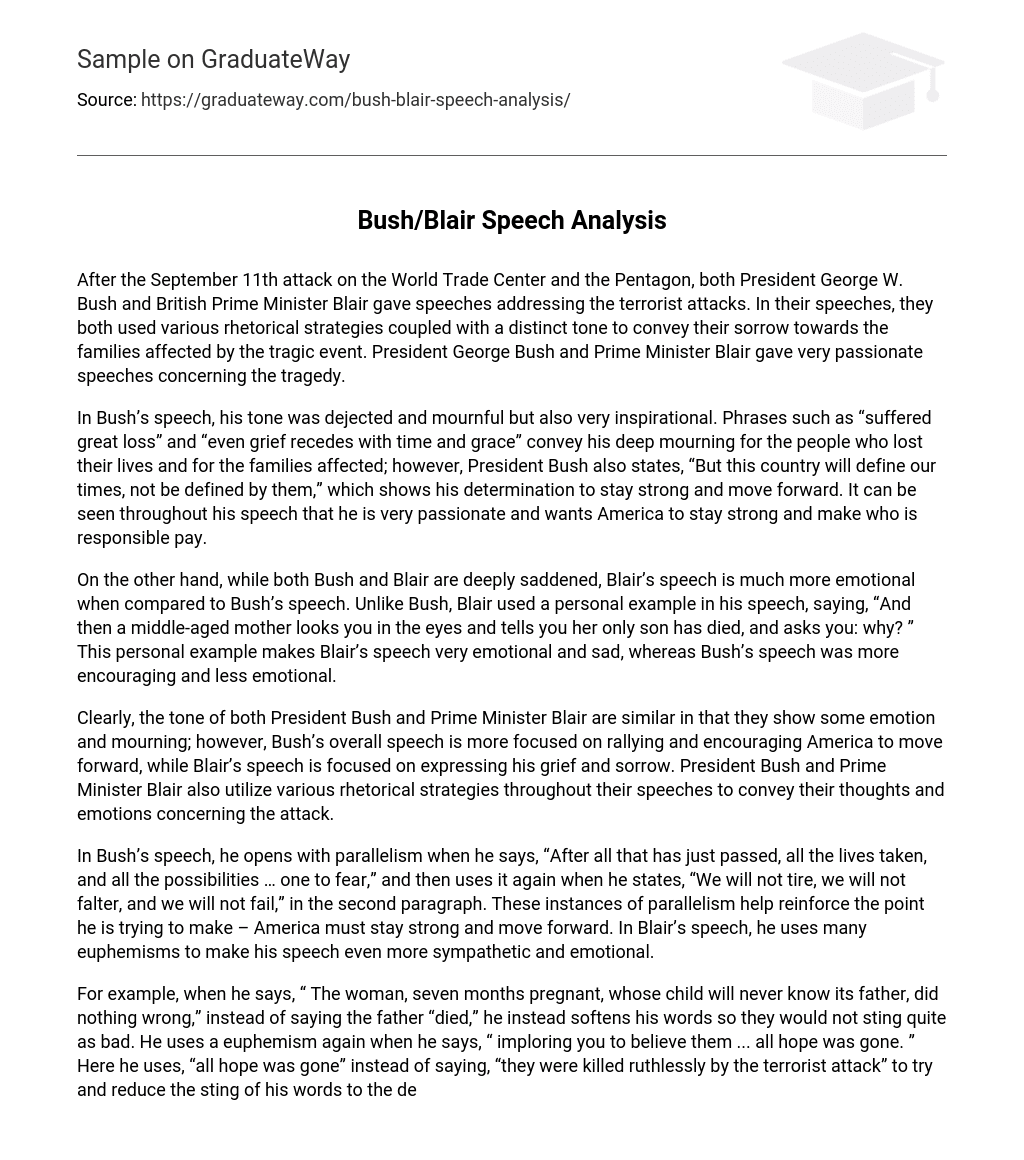After the September 11th attack on the World Trade Center and the Pentagon, both President George W. Bush and British Prime Minister Blair gave speeches addressing the terrorist attacks. In their speeches, they both used various rhetorical strategies coupled with a distinct tone to convey their sorrow towards the families affected by the tragic event. President George Bush and Prime Minister Blair gave very passionate speeches concerning the tragedy.
In Bush’s speech, his tone was dejected and mournful but also very inspirational. Phrases such as “suffered great loss” and “even grief recedes with time and grace” convey his deep mourning for the people who lost their lives and for the families affected; however, President Bush also states, “But this country will define our times, not be defined by them,” which shows his determination to stay strong and move forward. It can be seen throughout his speech that he is very passionate and wants America to stay strong and make who is responsible pay.
On the other hand, while both Bush and Blair are deeply saddened, Blair’s speech is much more emotional when compared to Bush’s speech. Unlike Bush, Blair used a personal example in his speech, saying, “And then a middle-aged mother looks you in the eyes and tells you her only son has died, and asks you: why? ” This personal example makes Blair’s speech very emotional and sad, whereas Bush’s speech was more encouraging and less emotional.
Clearly, the tone of both President Bush and Prime Minister Blair are similar in that they show some emotion and mourning; however, Bush’s overall speech is more focused on rallying and encouraging America to move forward, while Blair’s speech is focused on expressing his grief and sorrow. President Bush and Prime Minister Blair also utilize various rhetorical strategies throughout their speeches to convey their thoughts and emotions concerning the attack.
In Bush’s speech, he opens with parallelism when he says, “After all that has just passed, all the lives taken, and all the possibilities … one to fear,” and then uses it again when he states, “We will not tire, we will not falter, and we will not fail,” in the second paragraph. These instances of parallelism help reinforce the point he is trying to make – America must stay strong and move forward. In Blair’s speech, he uses many euphemisms to make his speech even more sympathetic and emotional.
For example, when he says, “ The woman, seven months pregnant, whose child will never know its father, did nothing wrong,” instead of saying the father “died,” he instead softens his words so they would not sting quite as bad. He uses a euphemism again when he says, “ imploring you to believe them … all hope was gone. ” Here he uses, “all hope was gone” instead of saying, “they were killed ruthlessly by the terrorist attack” to try and reduce the sting of his words to the delicate victims. Clearly, both Bush and Blair use different rhetorical strategies in their speeches to convey their thoughts about the September 11th terrorist attack.
Bush uses parallelism, while Blair uses euphemisms to effectively do this. President Bush and Prime Minister Blair both used some different tones and various rhetorical strategies throughout their speeches. Bush’s speech had a mostly encouraging tone coupled with parallelism, whereas Blair’s speech had a more emotional tone and utilized euphemisms. Although different, both speeches effectively conveyed the two’s thoughts concerning the tragic event of the September 11, 2001 terrorist attack on the United States.





